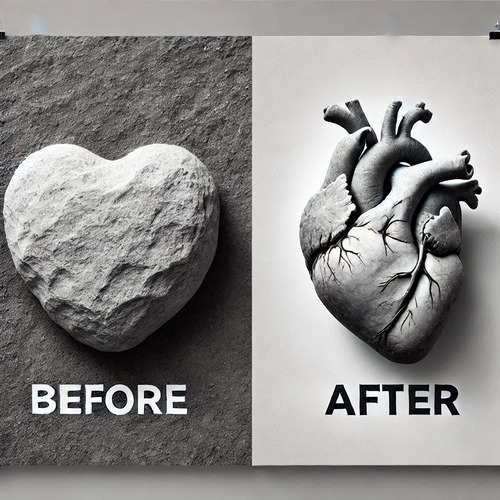Can Christians Be Organ Donors? Biblical Wisdom for Our Times
Can Christians Be Organ Donors? In the United States alone, over 100,000 people await life-saving organ transplants. For Christians grappling with decisions about organ donation, the medical reality raises profound questions about the intersection of faith and modern medicine. While Scripture doesn’t directly address organ donation, it provides timeless principles that can guide our thinking on this vital issue.
The Human Body in Scripture
Let’s begin with a biblical understanding of the human body. Scripture teaches we’re created in God’s image (Genesis 1:26-27): this imbues our physical bodies with inherent dignity and worth. The body is not a mere shell but a temple of the Holy Spirit (1 Corinthians 6:19-20), and this truth shapes how we think about its use and purpose.
The Bible presents not only an elevated view of the body, but also the resurrection. Our earthly bodies are not our final bodies; we await glorified bodies in the resurrection (1 Corinthians 15:42-44). This transformation suggests the temporary disposition of our earthly remains does not impact our eternal bodily resurrection.
Biblical Principles Supporting Organ Donation
Several Bible principles appear to support the concept of organ donation. Our Lord taught us there is no greater love than laying down one’s life for others (John 15:13). While this primarily refers to spiritual sacrifice, it establishes a principle of self-giving love that may extend to the gift of physical life through organ donation.
Moreover, throughout His ministry, Jesus demonstrated particular concern for physical healing. His miracles often involved bodily restoration, suggesting that participating in others’ physical healing aligns with His ministry’s character. This healing ministry was part of His broader demonstration of love for neighbour, a principle He commands us to emulate.
Addressing Common Theological Concerns
Some Christians worry organ donation may interfere with the resurrection body. However, Scripture teaches God will raise the dead regardless of the body’s physical condition or location. Consider those who’ve died in fires, at sea, or in war—their scattered remains present no obstacle to God’s resurrection power. The same God who can resurrect a decomposed body can certainly resurrect one that has shared its organs.
Others question whether accepting organ donation represents a lack of faith in God’s healing power. Yet Scripture shows us God often works through means, including medical intervention. Just as Paul advised Timothy to take wine for his stomach ailments (1 Timothy 5:23), we may view modern medical capabilities as God’s provisions for healing.
Examples of Self-Sacrifice in Scripture
Christ’s sacrifice forms our supreme example of giving ourselves for others. While His sacrifice was unique and redemptive, it establishes a pattern of self-giving love that His followers are called to emulate. Romans 12:1 calls us to present our bodies as “living sacrifices,” suggesting the physical dimension of sacrifice can be part of our spiritual worship.
Throughout church history, Christians have understood the principle of sacrifice as including medical service to others. From early Christians caring for plague victims to the establishment of hospitals, believers have long seen medical care as an extension of Christ’s love.
Ethical Considerations Through a Biblical Lens
Several ethical considerations require careful biblical reflection. The timing of death and questions of consent must be approached with wisdom and respect for God’s sovereignty. Scripture’s clear prohibition of murder requires careful protocols to ensure organs are only procured after death or in cases of living donation where the donor’s life is not endangered.
The commercialisation of organ donation raises additional ethical questions. While Scripture doesn’t prohibit payment for medical services, the exploitation of the vulnerable clearly violates biblical principles of justice and care for the poor. These concerns require careful consideration and appropriate safeguards.
Living organ donation (such as giving a kidney) presents considerations that are different from posthumous donation. The biblical principles of self-sacrificial love and care for others may support such donation, provided it doesn’t violate the responsibility to care for one’s own body as God’s temple.
Can Christians Be Organ Donors?—Conclusion
While Scripture doesn’t explicitly address organ donation, its principles of sacrificial love, stewardship of God’s gifts, and care for others suggest organ donation can be a legitimate—even commendable—choice for Christians. At the same time, such decisions remain matters of personal conscience before God.
The decision to become an organ donor ultimately requires prayerful consideration of biblical principles and personal circumstances. We must remember our bodies, both in life and death, belong to the Lord. Whether choosing to donate or not, our decisions should flow from faith and aim to glorify God.
Let’s approach this issue with wisdom, recognising God’s sovereignty extends over medical advancement. We can be His instruments in extending life to others, even as we look forward to the perfect bodies promised us in the resurrection.
Can Christians Be Organ Donors?—Related FAQs
If God ordained someone’s time to die, isn’t organ donation interfering with His sovereign plan? God’s sovereignty works through means, including human actions and medical intervention. Just as we don’t view using antibiotics or having surgery as thwarting God’s will, organ donation can be seen as one of the means through which God accomplishes His purposes. Scripture shows us repeatedly that human responsibility and divine sovereignty work together mysteriously in God’s providence, as seen in passages like Acts 27 where both divine promise and human effort were involved in saving lives.
- Is it ethical to remove organs from someone who is ‘brain dead’ but whose heart is still beating? The biblical understanding of death involves the departure of the soul from the body, though Scripture doesn’t specify the exact physiological moment this occurs. Medical criteria for brain death, when properly applied, indicate an irreversible cessation of all brain function, including the capacity for consciousness and breath. Given that breath (nephesh) is closely connected to life in Scripture (Genesis 2:7), and that the capacity for consciousness and breath are permanently lost in true brain death, Christians believe accepting brain death criteria can align with biblical principles while requiring proper safeguards and clear medical protocols.
- Should Christians specify organ donation only to other Christians? The biblical command to love our neighbour makes no distinction based on the recipient’s faith, as illustrated in the parable of the Good Samaritan. Just as God “sends rain on the just and on the unjust” (Matthew 5:45), Christians are called to do good to all people, especially in matters of life and death. Restricting donation to fellow believers would inappropriately limit our witness of God’s common grace and mercy to all humanity.
What about the use of foetal tissue from abortions for medical purposes? Christians believe the use of tissue from deliberately aborted foetuses represents cooperation with a gravely sinful act and must be rejected outright by us, regardless of potential medical benefits. The biblical principle that we must not do evil that good may come (Romans 3:8) applies directly here. Alternative medical research methods should be pursued that don’t involve complicity with the taking of innocent life.
- Should Christians agree to donate organs for research purposes, or only for direct transplantation? Medical research that respects human dignity and aims to relieve suffering aligns with our mandate to exercise dominion over creation and show mercy. However, Christians should seek assurance that their donated organs will be used ethically and respectfully, not treated as mere experimental material. Clear guidelines should be established, similar to how Joseph of Arimathea treated Jesus’ body with dignity even after death.
- Is it ethical to prioritise organ recipients based on lifestyle choices or social criteria? While medical criteria for successful transplantation must be considered, making moral judgements about recipients’ worthiness based on lifestyle choices usurps God’s role as judge. Such decisions could reflect human prejudices rather than biblical wisdom and mercy. The divine distribution of common grace and the universal need for redemption suggest that medical care should be allocated based on medical need rather than social or moral criteria.
Should Christians consider selling organs in regions where this is legal? While Scripture doesn’t explicitly forbid selling body parts, the commercialisation of organ donation risks exploiting the poor and treating the human body as a mere commodity rather than a temple of the Holy Spirit. The biblical principles of protecting the vulnerable and maintaining human dignity suggest organ donation should remain a gift rather than a commercial transaction. Our bodies belong to God, not the marketplace, and treating them as products for sale could violate their sacred purpose.
Can Christians Be Organ Donors?—Our Related Posts
Editor's Pick

Does the Bible Demean Women? Unmasking Satan’s Lies
*Editor’s Note: This post is part of our series, 'Satan’s Lies: Common Deceptions in the Church Today’… From the very [...]

Satan’s Lie: God’s Too Harsh on Unbelievers
*Editor's Note: This post is part of our series, 'Satan’s Lies: Common Deceptions in the Church Today’… "I just can't [...]

Satan’s Lie: ‘God Hasn’t Given Us Evidence to Believe’
*Editor's Note: This post is part of our series, 'Satan’s Lies: Common Deceptions in the Church Today’… “For since the [...]

When God Gives Us A New Heart: How Grace Rewires Our Desires
A REFORMED GUIDE TO SPIRITUAL TRANSFORMATION A Mystery: How Our Heart Changes Over Time It’s nothing less than a profound [...]

The Lost Empire of the Hittites: How Archaeology Proved the Bible Right
Standing in the scorching Turkish sun in 1906, archaeologist Hugo Winckler could hardly believe his eyes. Before him lay the [...]

The Priesthood of All Believers: What the Bible Really Teaches
The concept of the priesthood of all believers is one of the most revolutionary doctrines to emerge from the Protestant [...]

Are Children Punished For Parents’ Sins? What Does Scripture Really Say?
The question haunts many believers: "Will I be punished for what my ancestors did?" Perhaps we’ve heard stories of "generational [...]

Patterns In Chaos: How Fractals Scream Intelligent Design
In the beginning, God created the heavens and the earth, bringing order from chaos. Today, mathematical patterns known as fractals [...]

Nature’s Ultimate Computer: The Human Brain Defies Evolution
The human brain contains roughly 100 billion neurons forming 100 trillion synaptic connections—a level of complexity that surpasses our most [...]

More than Conquerors: Gospel Victory in Fighting Temptation
THE FALL, THE CONSEQUENCES, THE DELIVERANCE The story of temptation is as old as humanity itself. In the perfect garden [...]
SUPPORT US:
Feel the Holy Spirit's gentle nudge to partner with us?
Donate Online:
Account Name: TRUTHS TO DIE FOR FOUNDATION
Account Number: 10243565459
Bank IFSC: IDFB0043391
Bank Name: IDFC FIRST BANK






